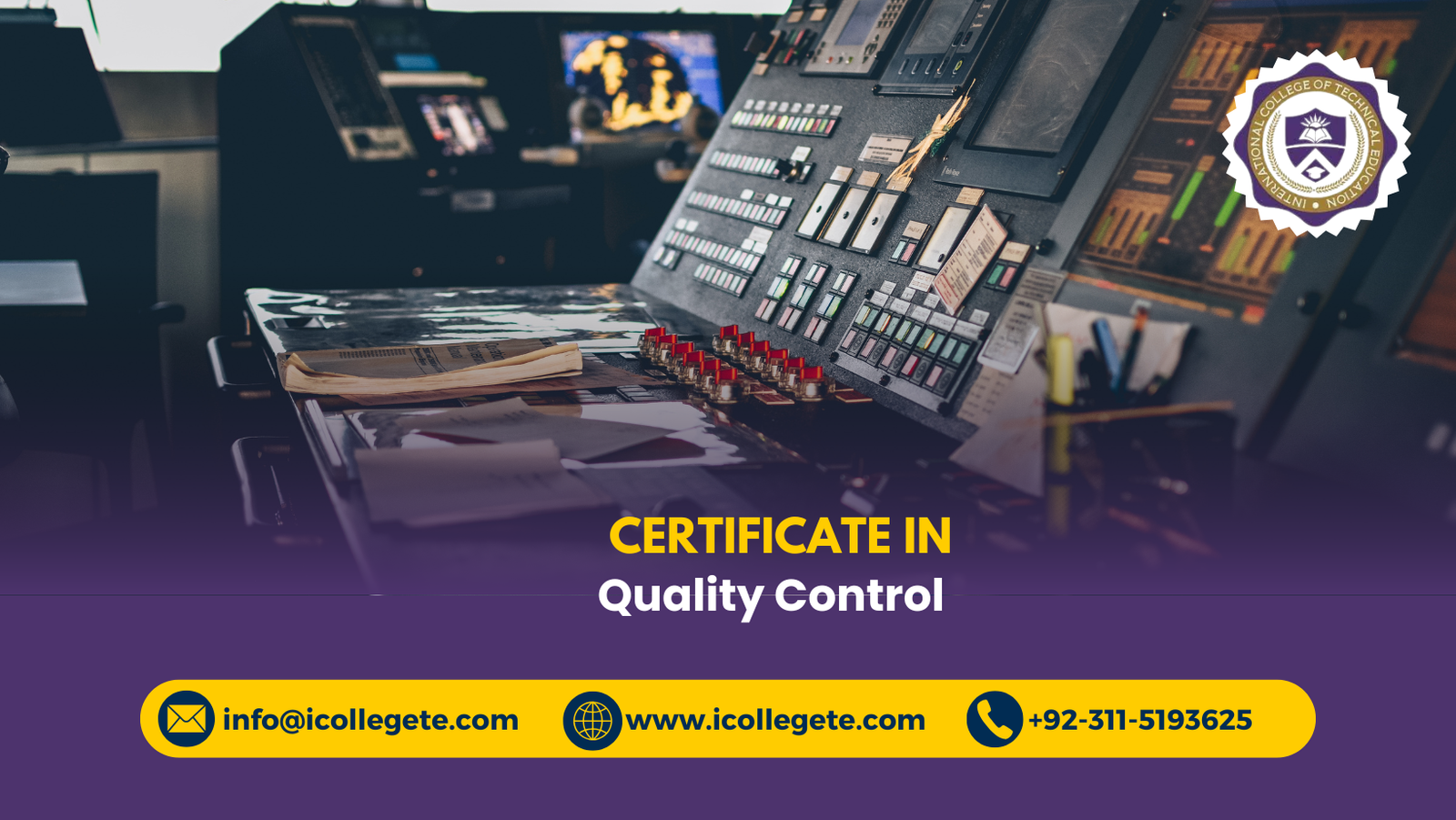The Quality Control course in Jhelum is designed to provide learners with core knowledge and practical skills required to ensure products and processes meet defined standards across various industries. As businesses strive to maintain high quality and efficiency, the role of quality control professionals has become increasingly vital. Quality Control course in Jhelum introduces learners to the principles, techniques, and tools used in inspecting, testing, and monitoring product quality during manufacturing or service delivery. Quality Control course in Jhelum covers essential topics such as defect analysis, process control, statistical quality techniques, and compliance with international standards.
Participants will gain hands-on experience in using inspection instruments, testing methods, and quality control documentation. The Quality Control course in Jhelum emphasizes real-world applications through case studies, practical sessions, and industry-based examples, enabling learners to detect quality issues early and implement corrective actions efficiently. Quality Control course in Jhelum will learn how to interpret quality data, maintain records, and support the implementation of quality assurance systems focused on continuous improvement.
The curriculum explores current quality management methodologies, including lean techniques and Six Sigma tools, to help learners develop a systematic approach to improving processes. These skills are indispensable across manufacturing, construction, engineering, and service sectors where consistent quality is essential for customer satisfaction, safety, and competitiveness.
Whether you are starting your career or enhancing your professional capabilities, the Quality Control course in Jhelum offers a structured pathway to becoming a competent quality control professional. Graduates of Quality Control course in Jhelum will be well-equipped to support quality systems, minimize defects, and ensure products and services meet specified standards and expectations.
Course Overview
- Understanding the principles and practices of quality control
- Learning inspection, testing, and monitoring techniques
- Using quality tools and instruments for product evaluation
- Understanding compliance with standards and regulations
- Applying process control and statistical quality methods
- Developing documentation and reporting skills
- Implementing quality assurance and improvement systems
- Enhancing operational efficiency through defect prevention
Course Study Units
- Introduction to Quality Control Fundamentals
- Inspection Methods and Testing Procedures
- Quality Tools and Measurement Techniques
- Process Control and Statistical Quality Control
- Defect Identification and Root Cause Analysis
- Quality Documentation and Reporting Systems
- Standards, Compliance, and Regulatory Requirements
- Continuous Improvement and Lean Techniques
- Quality Assurance and Management Systems
- Industry Applications of Quality Control
Course Learning Outcomes
- Understand core quality control concepts and practices
- Use inspection tools and perform testing procedures
- Identify and analyze defects in products and processes
- Implement process control and quality improvement techniques
- Ensure compliance with standards and customer requirements
- Interpret and utilize statistical quality control data
- Maintain accurate quality records and documentation
- Support continuous improvement and lean practices
- Enhance problem-solving and decision-making capabilities
- Apply quality control techniques in real industry situations
- Improve operational efficiency and productivity
- Contribute to customer satisfaction and safety
- Work effectively as part of a quality control team
- Support quality assurance systems in organizations
Entry Requirements for this course
- Minimum education of high school or equivalent
- Basic understanding of technical or operational processes
- Interest in quality control and inspection roles
- Ability to participate in practical exercises and training
- No prior experience required but preferred
- Strong attention to detail and analytical mindset
- Good communication and reporting skills
- Commitment to complete study units and assessments
- Motivation for a career in quality control or quality assurance
- Ability to apply problem-solving techniques in real settings
- Willingness to learn inspection tools and quality methods
- Understanding of safety and compliance practices
- Ability to work independently and in teams
- Willingness to adapt to industrial environments
Course Benefits
- Comprehensive understanding of quality control principles
- Hands-on skills in inspection and defect analysis
- Improved employability in multiple industrial sectors
- Knowledge of regulatory standards and compliance
- Preparation for roles in quality assurance and testing
- Enhanced analytical and decision-making capabilities
- Ability to reduce defects and improve productivity
- Contribution to customer satisfaction and product reliability
- Improved problem-solving and process control skills
- Exposure to modern quality tools and systems
- Career advancement opportunities in quality management
- Practical application of quality concepts in industry
- Ability to support continuous improvement efforts
- Professional competence in quality control
Why someone choose this course
- To gain essential skills in quality control and inspection techniques
- To improve career prospects in manufacturing and service industries
- To ensure product and process compliance with standards
- To develop hands-on experience with testing instruments
- To learn defect prevention and process improvement methods
- To enhance problem-solving and analytical skills
- To contribute to production efficiency and customer satisfaction
- To prepare for positions in quality assurance and inspection teams
- To gain knowledge of lean, Six Sigma, and quality tools
- To stay competitive in a fast-growing industrial job market
- To support safety, performance, and regulatory compliance
- To gain professional recognition in quality control
- To be involved in continuous improvement projects
- To develop strong documentation and communication skills
Who can enroll in this course
The Quality Control course in Jhelum is well-suited for fresh graduates who want to enter industrial sectors with a specialization in inspection and quality assurance. Quality Control course in Jhelum serves as an excellent starting point for individuals seeking technical positions and provides foundational knowledge required for identifying, analyzing, and resolving quality-related issues. Graduates from science, engineering, or vocational backgrounds can greatly benefit by enhancing their employability and gaining essential skills that are in high demand.
Technicians, operators, and production staff who are already working in manufacturing units, workshops, or service industries and aspire to grow into quality control roles can also enroll. Quality Control course in Jhelum offers them formal training in industry-standard quality practices and equips them with the ability to use inspection equipment, document processes accurately, and implement corrective actions when defects are found.
Professionals in administrative or supervisory roles who collaborate with production, maintenance, or safety departments will find Quality Control course in Jhelum effective in expanding their understanding of quality systems and standards. The Quality Control course in Jhelum provides them with the ability to support continuous improvement, ensure compliance, and maintain high levels of product reliability and customer satisfaction.
Additionally, individuals planning to work abroad or in large-scale industrial projects will greatly benefit from completing Quality Control course in Jhelum as Quality Control course in Jhelum prepares them to meet international expectations and quality standards. With a balanced combination of theoretical knowledge and hands-on practical training, the Quality Control course in Jhelum empowers learners from diverse backgrounds to become confident and competent quality control professionals capable of contributing to operational excellence.
Future Progression for this course
- Eligibility for advanced certifications in quality assurance
- Career growth in manufacturing, engineering, and service sectors
- Opportunities for supervisory and managerial roles in quality control
- Preparation for positions in inspection, auditing, and testing
- Development of expertise in statistical and process control tools
- Ability to specialize in industry-specific quality systems
- Enhanced chances with multinational companies and large projects
- Progression into quality engineer or consultant positions
- Involvement in continuous improvement and lean management roles
- Increased technical expertise and problem-solving capacity
- Participation in international quality management programs
- Networking and professional development prospects
- Contribution to safer, efficient, and defect-free production processes
- Pathway to leadership roles in quality improvement initiatives






